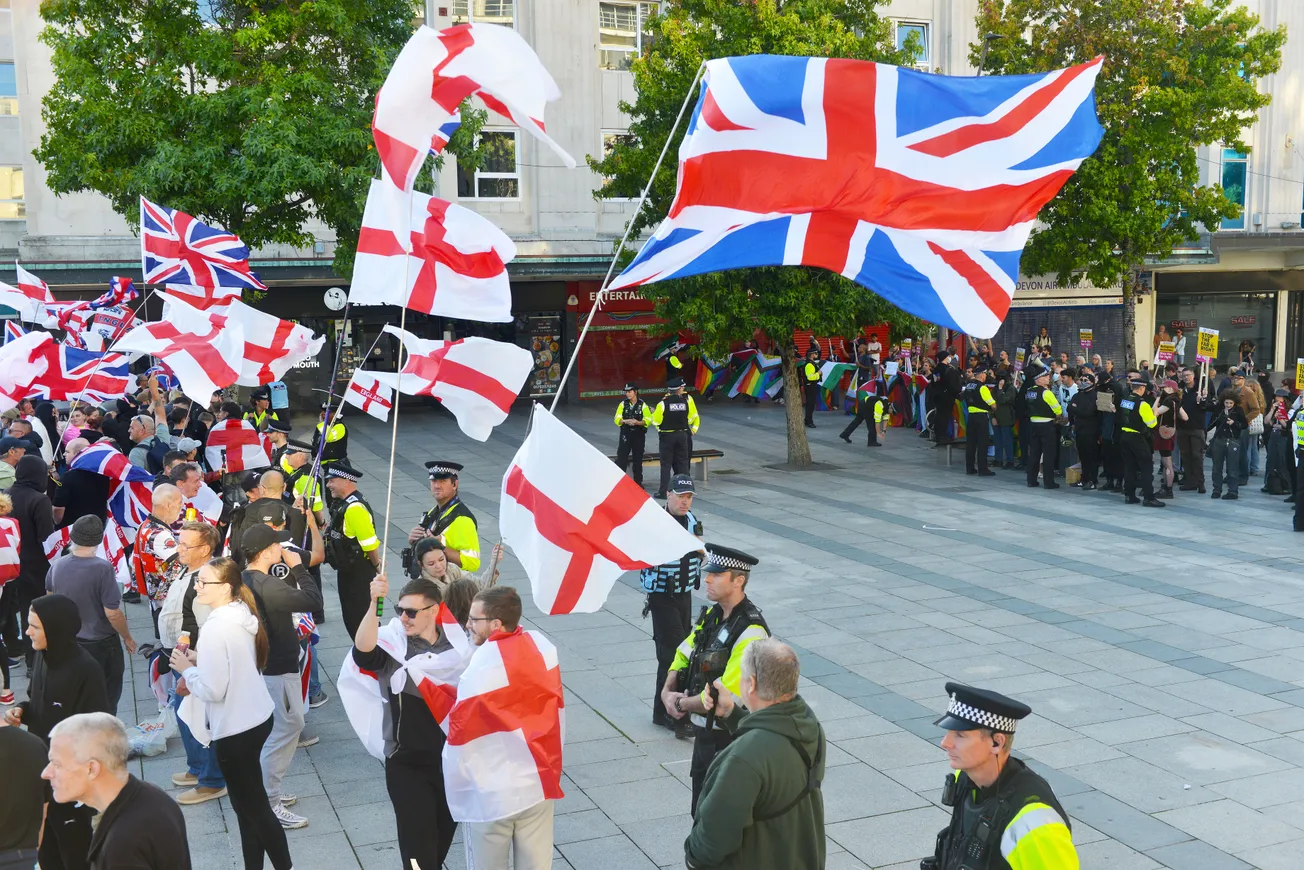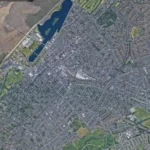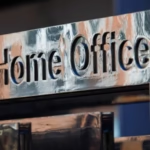Plymouth witnessed a tense but largely peaceful standoff today as two opposing groups gathered on Plymouth Hoe, turning the historic seafront into the latest stage for Britain’s ongoing debates over immigration, national identity, and government policy. Police maintained a significant presence throughout the day, working to keep the rival protesters apart and ensure that the demonstrations remained under control.
Two Movements, One Stage
The first group, “Patriots for Britain,” had announced its rally weeks in advance, framing the event as a call for tighter border controls and what they described as the “preservation of British values.” The second, a counter-protest organised by the grassroots collective “Plymouth United Against Hate,” emerged in response, vowing to “stand up for inclusivity and reject racism in all forms.”
By late morning, hundreds of supporters from both camps had converged on the Hoe. The broad expanse overlooking Plymouth Sound, usually filled with families and tourists, became a patchwork of banners, chants, and placards. Police in high-visibility jackets formed barriers between the two sides as tensions simmered, though physical clashes were largely avoided.
Police Praise “Orderly Conduct”
Devon and Cornwall Police deployed more than 150 officers, including mounted units and tactical support teams, to the scene. Temporary fencing and designated protest zones were established early Saturday to prevent direct confrontation.
Chief Superintendent Helen McCulloch commended the majority of participants for maintaining discipline. “While emotions ran high, both groups have largely respected police guidance and demonstrated within their agreed areas,” she said. “Our officers were proactive in preventing flashpoints and ensuring public safety.”
The force also confirmed that a small number of individuals were detained for public order offences and possession of prohibited items, though no major injuries or property damage were reported.
City Officials Call for Calm
Plymouth City Council officials issued a statement late in the afternoon urging residents to stay clear of the protest area and avoid spreading misinformation online. “Freedom of expression is a fundamental right,” the statement read, “but it must be exercised responsibly and without endangering others. The council thanks police and emergency services for their coordinated efforts today.”
Mayor Janice Ellison, speaking to reporters, called for unity in a city that has prided itself on its maritime openness and multiculturalism. “Plymouth’s strength lies in its diversity,” she said. “We must not let outside influences sow division among us.”
An Underlying National Debate
The demonstrations come amid growing tension across the UK over immigration and social cohesion, themes that have increasingly dominated political discourse. Government plans to tighten asylum policies and restrict migrant arrivals have sparked both support and outrage.
Analysts say events like today’s are symptomatic of a wider struggle within British society — between those who feel left behind by globalisation and those pushing for a more open, inclusive national identity.
“Protests like these aren’t just about immigration; they’re about belonging,” explained political sociologist Dr. Oliver Benton from the University of Exeter. “People feel disconnected from power and uncertain about the future. Unfortunately, that anxiety can be channelled by groups at both extremes.”
The Human Side of the Divide
For many participants, the day was as much about community solidarity as it was about politics. Members of “Plymouth United Against Hate” handed out flyers promoting tolerance and equality, while volunteers offered free refreshments to bystanders and police officers.
“Hatred has no home here,” said local teacher Sarah Mills, who attended with her family. “We’re here to show our students that standing up for kindness is powerful. You can disagree without being cruel.”
On the other side, members of “Patriots for Britain” insisted their movement was being unfairly vilified. “We’re ordinary people worried about our towns changing too fast,” said Dave Roberts, a retired dockworker from Devonport. “We’re not racists; we just want fairness and security for British workers.”
Despite starkly opposing views, both groups shared one concern — a sense of frustration with political leaders who, they felt, were failing to listen to ordinary voices.
Heavy Security Presence and Precautionary Measures
Local businesses prepared for potential disruption, with some cafés and shops around Hoe Road and Citadel Road choosing to close early. Police placed temporary roadblocks and parking restrictions throughout the morning, while drones were used to monitor crowd movements.
Public transport adjustments were also made, with Stagecoach and Citybus services rerouted to avoid congestion. The measures appeared effective: by 5 p.m., police reported that the majority of attendees had dispersed peacefully.
Paramedics were on standby, though no serious medical incidents were reported. Clean-up crews began removing barriers and litter soon after the event concluded.
Community Reaction Mixed
Reaction across Plymouth has been divided. Some residents expressed relief that the protests remained non-violent, while others criticised both sides for creating unnecessary disruption.
“It’s good people can voice their views, but this could’ve easily turned ugly,” said café owner Maria Lopez. “Police did a great job, but I hope we don’t have to go through this again soon.”
Others defended the gatherings as an expression of democracy. “It’s our right to protest,” said university student Jake Hamilton. “If we stop people from speaking, resentment just festers. The fact it stayed peaceful is something we should all be proud of.”
Police to Review Operation
Chief Superintendent McCulloch confirmed that the force would conduct a review of the day’s policing strategy. “Every operation provides lessons,” she said. “Our goal is always to balance public safety with the right to free expression.”
She praised local residents for their patience and cooperation, particularly those affected by road closures. “We’re grateful to everyone who adjusted their plans today,” she added.
A Peaceful End to a Heated Day
As the sun set over Plymouth Hoe, the city’s famous war memorial and lighthouse stood in stark contrast to the heated exchanges of the day — a reminder of endurance, resilience, and the shared history that binds the community together.
While divisions remain, the day ended without violence, a small victory in a time of polarisation. For many locals, it reinforced the belief that even in disagreement, civility and mutual respect can still prevail.
In the words of Reverend Andrew Callow of St. Andrew’s Church, who observed the protests from afar, “Dialogue, even when difficult, is the lifeblood of democracy. Plymouth showed today that we can disagree passionately — but peacefully.”



